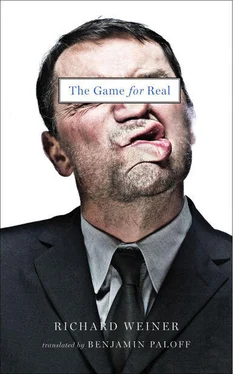When he went out the next morning and headed for the square, he knew, even before he locked up, that he was no longer there: he had been replaced by his legend. A legend without beginning or end, a narrative as yet illegible, but therefore almost more credible than him, than the banal mediocrity of his impoverished existence.
He walked the street; he walked the lane of bitchy old broads. Broads of every age, broads who were somehow black — here a pleated jabot, here a skirt of mourning, here some black cockscomb, and all of it black with a sort of insatiable blackness into which the remaining color collapsed, as if through a trap door. Broads who were already decrepit — the sort of clumps of nettles they’re waving, they’d happily lash you, but they can no longer pull off anything more than a curious pawing. — And that one there with the short, black crutch with the India-rubber end, which, having detected him, gave the agreed-upon signal, tapping on the slabs of the dusky sidewalk to the witch’s kitchen. And her, cursing, with cold-sensitive hands beneath a black knitted cape, whose forgetful eyes, once they’d met his, took to bemoaning their having forgotten to slip away in time. And that old broad, empty as a gutted fish, who you would say was chewing, chewing on aphrodisiacal herbs. And that old broad hurrying along, with the full, pallid, still full-moon face of a mother of six, wherein sit her eyes, dead but flammable like cinders, with which she berates from behind a lily-white curtain. .
When at last he turned around. .
And what to do with that nosy, tardy, retarded and scurrying old broad who nevertheless couldn’t even get it together to let loose a heavy pearl of the chilly black blood of the old broads from Rue Bel-Air and have it fall as casually and apathetically as a potent malediction!
The café had a terrace, and the terrace was on the corner of the main street and the square with the “lover’s lane.”
He saw him already from a distance. He was walking like someone who knows that nothing will stand in his way: swaggering with the prickly shyness of someone whom life has taught that obstacles would be swept from his path not because they feared his strength, but because they detested him. . He was walking quickly, as though with purpose, and all over the place, like one who, having no aim, is afraid lest someone else catch him at one of his potential purposes. He was beautiful, with a beauty so violently specific that it shouted “en garde!” even from a distance; he was beautiful with the false beauty of an ill-formed fruit, which one’s gaze graces but shyly, afraid of discovering the morbid flaw from which this accursed beauty rises.
He saw him already from a distance, and having caught up with him from behind, he looked him over with a certainty that would tolerate no protest that that other fellow was fleeing from Sodom toward him, who would not be caught. — The young man drew closer; before him, like a king’s guard, the impudent consciousness of his own beauty; behind him, like an uncalled-for crying fit, the certainty that he was just a little boy, and that his beauty would sour and curdle, and that nothing would replace it, not even the declamatory braggadocio of old-timers who have acquiesced to being old-timers. He was encouraging this rottenly ripening beauty with a harvest of smiles that feigned indifference and fished around for someone to whom they might hungrily appeal; he was disdaining it with a lattice of long, groomed, pasted eyelashes that denied the presence of lust no differently than a valet who’s been slapped around denies the presence of the master with a guilty conscience. Eyes on guard: whether against an unexpected challenge jumping out at him head-on, or against a creeping swear word slipping decently away. He was thirstily drawing closer, and with a prideful hopelessness. On his unclouded brow, a charming lock with an impudent nod toward the open secret that it hadn’t fallen there by accident, but as a favor to the fingers, so that, in brushing it away, they might have a pretext to flaunt themselves; as a favor to those spindly fingers, so slender you wouldn’t know whether to think them the touches of a harp or those of lewd intent. –
It seemed he wasn’t from there, for he was still keeping to the street he was on, but they knew him, for hardly had the shoppers and shopkeepers detected him on their doorsteps than their eyes swept after him as though sweeping away anonymous letters that, arriving daily, no longer perturbed them.
He saw him already from a distance, but when the other fellow spotted him, he flared his nostrils, already just as much on the scent, but till then indecisive. But now they were certain, and from beneath the shadowy eye sockets an unabashed, masterfully aimed harpoon had been hurled; it sank into the pupils of the seated man. Its thrower was drawing near; the rope with the barbed hook was being reeled in, and because of it that fellow there was looking faster than he was walking —it was more and more provocative. To get loose! Free himself from that taut and disgraceful attention, which he is resisting forcefully, but which is pressing him all the more boorishly. That’s how it goes with force; that’s how it goes with violence; oh, that he can’t break away of his own serene will! Oh, that he can’t break away without immediately having the urge to find out what he thinks about the disposition of the coerced contract, he who’s suddenly arriving at so assuredly deliberate a pace. . He who, having impudently examined this embarrassed ruse, was now lurking with a harpoon that was even less embarrassed, even more prophetic, that he might use to hit the panicked and naïve inspection of his ostensible superiority right in the pupils. — And because the strider was arriving right at the level of the sitter, there was nothing for their entwined gazes to do but veer one after the other, veer under torque so powerful that it even jerked their heads. Now it’s like this: the strider, who till then had been looking in the direction of the square he was walking toward, turns his head toward the road already travelled, and the fellow who had thus far been staving off the one drawing nearer latches on with a gaze that is hateful and enigmatic even to himself, but he must, he must follow him whose person he already knows. But himself? Does he then know himself? Does he then, at least, know the enigma of a look that despisedly summons the despised?
The youth — how peskily beautiful he was, and how wonderfully his obstinate wickedness succeeded in aping the contemptuous disregard, the draped toga, of dignitaries betrayed, — the youth, having arrived, at a deceleratingly hurried pace, at the corner, from where he was supposed to flit across the square, stopped. He stopped, having preceded this with three embarrassedly apologetic little steps, the third of which was the first on the serpentine course of the hope he denied. He turned to face the seated man: he unfastened his pupils from him and harnessed them to the mystery of the café’s green window boxes of rhododendrons. He didn’t dare step forward or walk away. His gaze, which knew another’s was lying in wait for it, hunkered down beneath the shrubbery, as if down a vertical scale whose regular segments it was now slowly creeping along all the way to the upper end, from which it was now just a blind leap, one that it will sure as hell make if it is cunningly aimed. From the right corner of his mouth, an uninterrupted pyrotechnic display of bashful smiles; they fester on his lower lip into an ironic disillusionment that dribbles dolefully downward. But the eyes proceed, and the line of sketched smiles thickens markedly. As if they suspected that they were passing by without leaving a trail. Someone amazed, someone whose eyes see while no longer having to look, is devouring these smiles. He is amazed at the mind that has already surmised the harm that has been inflicted, at the blood that is still resisting faith, at the senses aroused by a heretofore unknown prickling. He has studied the deceit of mendacious eyes; he knows full well that it’s not alluring eyes, but merely proffered eyes, that deceive; he is not misled by the proposition’s frightened hypocrisy, so while it might irritate him, while it might cause him shame, he suspects that both his ire and his shame were in league with that other fellow and against him in whom they had been kindled. Now! At last! Again they are eye-to-eye. All momentum was concentrated in their gazes: the bodies stiffened; but the eyes were like lunatic ants on a ruined anthill. They remain in each other’s eyes, hypnotized and so alert that they manage to answer questions that haven’t even been uttered yet, and ask questions for which an answer has long since been ready. . The youth’s face has turned to stone; hurl the harshest insult at it and the hieraticized injuries will fall numb upon this mask; the beauty, prostituted, made-up, yet triumphant over the morning sun, bedazzled in its triumph, is on the lookout for its own gender, which no longer applies. From the corners of his mouth, lizardy smile upon lizard-like smile. From the eyes of the one seated, frantic shot after shot, in vain: the lizards fall, and there’s no fewer of them.
Читать дальше












